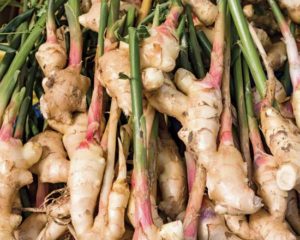The rhizome (underground part of the stem) is the part commonly used as a spice. It is often called ginger root, or simply ginger.
Contents
Uses
- Ginger is commonly used to treat various types of “stomach problems,” including motion sickness, morning sickness, colic, upset stomach, gas, diarrhea, irritable bowel syndrome (IBS), nausea, nausea caused by cancer treatment, nausea caused byHIV/AIDS treatment, nausea and vomiting after surgery, as well as loss of appetite.
- Other uses include pain relief from rheumatoid arthritis (RA), osteoarthritis, menstrual pain, upper respiratory tract infections, cough, respiratory problems, migraine headache, bronchitis, and diabetes.
- Sometimes used for chest pain, lowback pain, and stomach pain, discontinuing use of drugs called selective serotonin reuptake inhibitors (SSRIs), anorexia, to stimulate breast milk, as a diuretic, and to increase sweating.
- Used to treat cholera, bleeding, bacterial bloody diarrhea, baldness, malaria, inflamed testicles, poisonous snake bites, and toothaches.
- Some people pour the fresh juice on their skin to treat burns. The oil made from ginger is sometimes applied to the skin to relieve pain.
- Ginger extract is also applied to the skin to prevent insect bites.
- In foods and beverages, ginger is used as a flavoring agent.
- In manufacturing, ginger is used as for fragrance in soaps and cosmetics.
- One of the chemicals in ginger is also used as an ingredient in laxative, anti-gas, and antacid medications.
Benefits
- Ginger’s ability to combat a variety of diseases and conditions is due in part to its impact on excessive inflammation, which is a significant underlying cause of many illnesses. Inflammation is the body’s natural healing response to illness or injury, and its pain, redness, heat, and swelling are attempts to keep you from moving a damaged area while it is being repaired. Inflammation subsides as the body heals. However, in some conditions, including arthritis, diverticulosis, gallbladder inflammation, and heart disease, the inflammation does not go away. It becomes chronic and leads to many other problems.
- Ginger is particularly useful in treating chronic inflammation because it partially inhibits two important enzymes that play a role in inflammation gone awry — cyclooxygenase (COX) and 5-lipoxygenase (LOX).
- While anti-inflammatory drugs block COX more strongly, they don’t affect LOX at all and therefore only address part of the problem. Even worse, anti-inflammatory drugs can cause side effects, such as ulcers, because they also block the beneficial effects that COX has on the digestive tract, including protecting the stomach.
- Ginger does not cause stomach irritation; instead it helps protect and heal the gut. Ginger also treats a broader range of the inflammatory problem because it affects both the COX and the LOX enzymes. And because it doesn’t shut down the inflammatory process entirely, ginger may actually allow it to work properly and then turn itself off, the way it does with an injury.
- Besides reducing inflammation, ginger has many other benefits. It helps relieve nausea, destroys a host of viruses, and in some laboratory studies has shown promise as an anticancer agent.
Cautions
- Ginger is extremely safe. Some people have trouble tolerating its spiciness, but most tend to adapt if they keep taking it.
- Some concern has been raised because ginger may block platelets from sticking together and cause bleeding, but there have been no cases reported of bleeding in people taking ginger.
- However, do not take ginger with blood thinners without first consulting your health care professional. Ginger is safe to use for short-term use (a few days) in pregnancy.
Interactions
None are recorded. Unknown, please consult with your doctor.
Other names
African Ginger, Amomum Zingiber, Ardraka, Black Ginger, Cochin Ginger, Gan Jiang, Gingembre, Gingembre Africain, Gingembre Cochin, Gingembre Indien, Gingembre Jamaïquain, Gingembre Noir, Ginger Essential Oil, Ginger Root, Huile Essentielle de Gingembre, Imber, Indian Ginger, Jamaica Ginger, Jengibre, Jiang, Kankyo, Kanshokyo, Nagara, Race Ginger, Racine de Gingembre, Rhizoma Zingiberi, Rhizoma Zingiberis, Rhizoma Zingiberis Recens, Shen Jiang, Sheng Jiang, Shoga, Shokyo, Shunthi, Srungavera, Sunth, Sunthi, Vishvabheshaja, Zingiber Officinale, Zingiberis Rhizoma, Zingiberis Siccatum Rhizoma, Zinzeberis, Zinziber Officinale, Zinziber Officinalis
References
Source: WebMD, http://www.webmd.com/vitamins-supplements/ingredientmono-961-ginger.aspx?activeingredientid=961
Shape.com, http://www.shape.com/healthy-eating/diet-tips/health-benefits-ginger
Healthhowstuffworks, http://health.howstuffworks.com/wellness/natural-medicine/alternative/medical-uses-for-ginger-ga.htm

